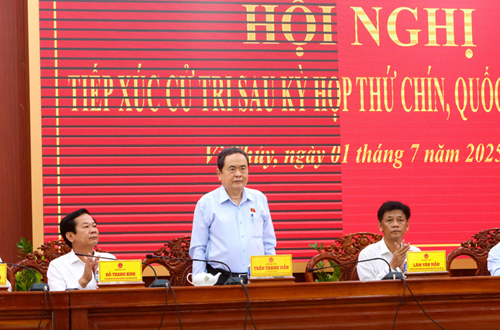The top legislator spoke highly of the voters' sincere and responsible opinions, expressing his gratitude for the public’s support for the Party’s and State’s new policies and guidelines aimed at national development.
The merger of Can Tho with the neighboring provinces of Hau Giang and Soc Trang into the new Can Tho city lays a favorable foundation for expanding development space and facilitating synchronized infrastructure investment, Man said, adding that this move is expected to drive breakthrough growth for Can Tho in line with the Politburo’s Resolution No.59-NQ/TW on the construction and development of Can Tho city by 2030 with a vision to 2045, as well as the N.A.’s Resolution No.45/2022/QH15 on piloting specific mechanisms and policies for the development of the new city.
    |
 |
|
National Assembly (N.A.) Chairman Tran Thanh Man speaks at the meeting with voters in the Mekong Delta city of Can Tho on July 1. |
He reported that during its 9th session, the N.A. passed a resolution on amendments and supplements to several articles of the Constitution of the Socialist Republic of Vietnam with absolute approval. The legislature also adopted a resolution on provincial-level administrative unit reorganization in 2025, along with a series of related laws and resolutions, providing a legal foundation for reforming and streamlining the two-tier local administration apparatus.
The N.A. Chairman said Vietnam now has 34 provincial-level administrative units, 696 district-level units were dissolved, and 10,035 commune-level units have been reorganized into 3,321.
Emphasizing this as a historic decision that reflects the will of the Party and the people, Man stated that the merger aims to streamline the organizational apparatus, enhance its effectiveness, efficiency, and responsiveness, bring authorities closer to the people, and expedite administrative procedures. He added that the restructuring is also intended to reduce administrative layers and staffing, allowing resources to be redirected toward investment and development.
Man emphasized that for the government apparatus to operate effectively, it must strongly embrace science and technology, digital transformation, and the application of artificial intelligence (AI). He noted that national development and progress must be driven by science, innovation, and digital transformation.
He urged all 103 communes and wards of Can Tho city to actively promote the "Digital literacy" movement launched by Party General Secretary To Lam.
The N.A. Chairman urged the localities in Can Tho to leverage their respective strengths and support one another in building a more diverse, flexible, and sustainable economic structure to drive socio-economic development and improve the material and spiritual well-being of locals.
To contribute to realizing the goal of Vietnam becoming an upper-middle-income country by 2030, Can Tho must strive to achieve a growth rate of at least 8% in 2025, laying the foundation for double-digit expansion in the 2026–2030 period, the top legislator said.
Man requested Can Tho to focus on economic development, boosting social investment, mobilizing public resources for development, and restructuring agriculture production to promote domestic consumption and exports.
He also asked for more efforts from the municipal authorities to address obstacles and bottlenecks, accelerate the progress of projects, and pour investment into synchronized infrastructure development, in order to drive socio-economic growth, enabling the country to enter a new era of prosperity and strong development.
Earlier the same day, the N.A. leader visited and inspected the official operation of the two-tier local administration system, as well as the handling of public administrative procedures for citizens and businesses at the public service center of Vi Thuy commune, Can Tho city.
He demanded leaders of Can Tho city, Vi Thuy commune, and the center, to make every effort to ensure the necessary conditions for seamless administrative procedure connectivity from the central level to the city and down to the commune. He emphasized the need to secure both human and material resources to ensure smooth and efficient administrative service delivery.
At the meeting, voters expressed their satisfaction with the outcomes of the N.A.’s 9th session, saying that the legislature reviewed and decided on many important and historic issues, closely tied to the demand for reform, institutional improvement, and the restructuring of the political apparatus to promote rapid and sustainable development.
They expressed their belief that the two-tier local government model will enable citizens to handle administrative procedures more quickly, promptly, and effectively.
However, they also raised concerns regarding infrastructure and transportation development in industrial zones, and tourism sites in Hau Giang and Soc Trang; special policies on eligibility for purchasing social housing for officials and public servants required to relocate to the new administrative center; the growing issue of online scams; and the need for stricter regulations on personal data protection and stronger enforcement against violations in cyberspace.
Source: VNA